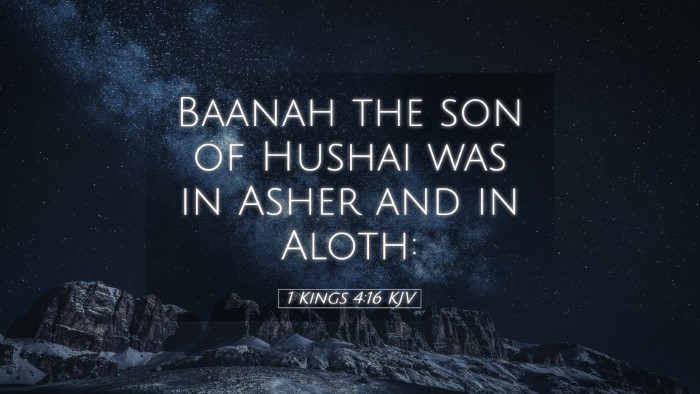Commentary on 1 Kings 4:16
Verse: 1 Kings 4:16
“Baanah the son of Hushai was in charge of the tribe of Asher; and Jehoshaphat the son of Paruah was in charge of the tribe of Issachar.”
Introduction
This verse continues the account of King Solomon's administration, indicating the leaders appointed over various tribes of Israel. This administrative structuring is significant, reflecting the wisdom of Solomon as he governs the kingdom.
Contextual Overview
The chapter serves as part of a larger narrative elucidating King Solomon's reign, where he establishes a well-ordered government that ensures the stability and prosperity of Israel. The listing of officials demonstrates a practical approach to governance where key figures are assigned to oversee specific tribes.
Commentary Insights
Leadership Structure
According to Matthew Henry, the detailed mention of tribal leaders showcases a decentralized but unified leadership structure which is crucial for a vast kingdom. Each leader’s role is specified, indicating Solomon's strategy to distribute responsibility while maintaining oversight.
Tribe-Specific Assignments
Albert Barnes observes that Baanah of Asher and Jehoshaphat of Issachar highlight that Solomon recognized the unique characteristics and needs of different tribes, assigning posts accordingly. This nuance is met with the wisdom of understanding local issues and strengths.
Spiritual Implications
Adam Clarke emphasizes the spiritual implications of governance. He notes that proper governance is reflective of divine order. Solomon’s oversight provided not only political stability but also an environment conducive to worship and adherence to God's laws, essential for the spiritual health of the nation.
Theological Reflections
This verse invites deeper theological reflection on the nature and purpose of leadership. The appointed leaders were not merely administrative figures but also role models for righteousness and justice. Their success and the success of the nation stemmed from their commitment to God’s principles and the king's example.
The Role of Community in Governance
Commentators like Henry argue that the structure promoted a sense of community and accountability within the tribes. By having leaders who were part of the tribes, people felt represented. This connection is fundamental and relevant for today, as effective leadership still depends on understanding and engaging with the community being led.
Application for Church Leadership
In modern pastoral practice, this passage serves as a reminder of the importance of appointing leaders who are both capable and connected to the congregations they serve. Leaders should not only demonstrate administrative skills but must also embody spiritual integrity and communal responsibility.
Qualities of Godly Leaders
- Wisdom: As Solomon was known for his wisdom, leaders today should seek God’s guidance in decision-making.
- Accountability: Just as tribal leaders were responsible for their regions, church leaders should be answerable to their congregations and to God.
- Integrity: Leadership within the church should reflect Godly character and adherence to His word, fostering trust and unity.
Conclusion
The assignment of Baanah and Jehoshaphat represents not just an administrative act, but a divine orchestration of leadership meant to foster a vibrant, united, and God-centered community. Solomonic wisdom in governance is a model for contemporary church leaders who seek to guide their congregations with integrity, accountability, and devotion to God’s purpose.
Final Thoughts
As we ponder over 1 Kings 4:16, let us commit to praying for our leaders, asking God to imbue them with wisdom, compassion, and dedication to the welfare of the communities they serve. In an era where leadership qualities are often skewed, Solomon's example offers a timeless guide in the pursuit of righteous leadership.


